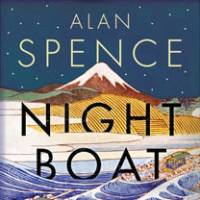"Night Boat" is Alan Spence's second novel set in Japan, but his first to deal entirely with Japanese characters and situations.
Night Boat, by Alan Spence
Canongate Books, Fiction.
The novel sees him sail into more risky waters than "The Pure Land," but it's a risk that predominantly pays off.
The novel is comprised of the life story of 18th-century Zen monk Ekaku Hakuin, from a young boy terrified by stories of hell to a Zen master scaring his own students.
The first half of the book is traditional youth to manhood stuff — resisting the temptations of women, giving in to the temptations of sake, struggling with the world and his own place in it. Seen from the unusual perspective of a Zen monk where each experience is filtered through the goal of achieving enlightenment and escaping the struggle of existence, the tropes are refreshed. The second half of the book is more fragmented, jumping from experience to experience, years passing in a word or two, and is less satisfying, but by then the reader has traveled so far with Hakuin, we are happy to keep following.
Spence has been a practicing Buddhist for decades and the book has grown out of his own journey. Both here and in his haiku collections he shows a skill for phrasing Zen koan in ways that speak to a Western mind, of turning the complex into the everyday without diminishing its power. This saves the novel from breaking down into a series of dry teachings.
The rush of elation when enlightenment is achieved and the deep sickness from crashing against a knotty koan are alive with the energy of actual experience.



